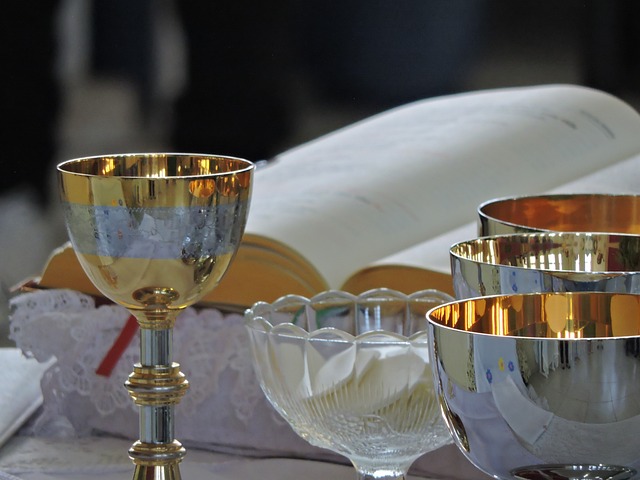Consecration in the Catholic Church refers to the act of dedicating a person, place, or object to God’s service or worship. It is a sacred ritual that involves invoking the Holy Spirit to bless and sanctify the individual or item being consecrated. This act is believed to set apart the person or object for a special purpose and to imbue it with spiritual significance.
Table of Contents
Importance of Consecration in Catholic Church
Have you ever heard the term “consecration” in the Catholic Church and wondered what it means? Consecration is a significant and sacred practice in the Catholic faith that holds great importance for believers. It is a ritual that involves dedicating something or someone to a sacred purpose, often involving a blessing or sanctification. In the Catholic Church, consecration is a powerful act that signifies a deep commitment to God and the Church.
Consecration is commonly associated with the Eucharist, the central sacrament of the Catholic Church. During the celebration of the Mass, the priest consecrates the bread and wine, transforming them into the body and blood of Christ. This act of consecration is believed to make Christ present in a real and substantial way, allowing believers to partake in the divine life of Jesus through the reception of the Eucharist.
The consecration of the Eucharist is a moment of profound reverence and awe for Catholics, as they believe they are truly encountering the presence of Christ in the sacrament. This belief in the real presence of Christ in the Eucharist is a central tenet of Catholic faith and is a source of great spiritual nourishment for believers.
In addition to the consecration of the Eucharist, there are other forms of consecration that hold significance in the Catholic Church. For example, individuals may choose to consecrate themselves to Mary, the mother of Jesus, as a way of deepening their devotion to her and seeking her intercession in their lives. This act of consecration involves a commitment to living a life of holiness and virtue in imitation of Mary’s example.
Consecration can also refer to the dedication of a church or religious building to God for sacred use. This act of consecration involves a special blessing and dedication ceremony, during which the building is set apart for worship and prayer. The consecration of a church is a solemn and joyous occasion for the community, as it signifies the building’s transformation into a sacred space where believers can gather to worship God.
The practice of consecration in the Catholic Church serves as a reminder of the sacredness of God’s presence in the world and the importance of living a life of faith and devotion. By consecrating objects, individuals, and buildings to God, Catholics seek to honor and glorify God in all aspects of their lives.
Consecration is not just a one-time event but is an ongoing process of dedicating oneself to God and seeking to live a life of holiness and virtue. It is a way for Catholics to deepen their relationship with God and grow in their faith through acts of devotion and prayer.
In conclusion, consecration plays a vital role in the Catholic Church as a means of expressing devotion to God and seeking to live a life of holiness and virtue. Whether through the consecration of the Eucharist, oneself to Mary, or a church building to God, Catholics engage in this sacred practice as a way of honoring and glorifying God in all aspects of their lives. Consecration serves as a powerful reminder of the presence of God in the world and the call to live a life of faith and devotion.
Rituals and Traditions of Consecration
Have you ever heard the term “consecration” in the Catholic Church and wondered what it means? Consecration is a sacred ritual that holds great significance in the Catholic faith. It is a solemn dedication to God, often involving the blessing or sanctification of an object or person. In this article, we will explore the meaning of consecration in the Catholic Church and its importance in the rituals and traditions of the faith.
Consecration is a powerful act of devotion and commitment to God. It is a way for Catholics to set apart something as holy and sacred, dedicating it to the service of God. This act of consecration can take many forms, from the blessing of a new church building to the anointing of a new bishop. In each case, the purpose is the same: to sanctify and set apart the object or person for God’s use.
One of the most common forms of consecration in the Catholic Church is the consecration of the Eucharist during Mass. This is when the bread and wine are transformed into the body and blood of Christ, a sacred act that Catholics believe brings them closer to God. The consecration of the Eucharist is a central part of the Catholic faith, and it is a ritual that is performed at every Mass.
Another important form of consecration in the Catholic Church is the consecration of a bishop. When a bishop is consecrated, he is set apart for a special role in the Church, with the authority to lead and guide the faithful. The consecration of a bishop is a solemn ceremony that involves the laying on of hands and the anointing with holy oil, symbolizing the bishop’s new role as a shepherd of the Church.
Consecration is also a key element in the dedication of new church buildings. When a new church is built, it is consecrated in a special ceremony that involves prayers, blessings, and the sprinkling of holy water. This act of consecration sets the church apart as a sacred space, dedicated to the worship of God and the gathering of the faithful.
In addition to these formal rituals of consecration, Catholics also practice personal consecration as a way to deepen their relationship with God. This can take the form of consecrating oneself to the Blessed Virgin Mary or to a particular saint, asking for their intercession and guidance in living a holy life. Personal consecration is a way for Catholics to express their devotion and commitment to God in a more intimate and personal way.
Overall, consecration plays a vital role in the rituals and traditions of the Catholic Church. It is a powerful act of dedication and devotion that helps Catholics to deepen their relationship with God and live out their faith in a tangible way. Whether it is the consecration of the Eucharist, the consecration of a bishop, or personal consecration to a saint, this sacred ritual is a central part of the Catholic faith. So next time you hear the term “consecration” in the Catholic Church, you’ll have a better understanding of its meaning and significance.
Biblical Basis for Consecration

Have you ever heard the term “consecration” in the Catholic Church and wondered what it means? Consecration is a sacred act that holds great significance in the Catholic faith. It is a ritual that involves setting something apart for a holy purpose, dedicating it to God. In this article, we will explore the biblical basis for consecration and its importance in the Catholic Church.
In the Bible, we see examples of consecration being practiced by the Israelites. In the book of Exodus, God instructs Moses to consecrate the tabernacle and all its furnishings. This act of consecration set the tabernacle apart as a holy place where God’s presence would dwell among His people. The Israelites were also instructed to consecrate themselves before approaching God, showing reverence and respect for His holiness.
Consecration is also seen in the New Testament, particularly in the context of the Eucharist. During the Last Supper, Jesus took bread and wine, blessed them, and gave them to His disciples, saying, “This is my body…this is my blood.” This act of consecration transformed the bread and wine into the body and blood of Christ, a sacred and holy mystery known as transubstantiation.
The Catholic Church believes that during the celebration of the Eucharist, the priest acts in persona Christi, in the person of Christ, and through the power of the Holy Spirit, consecrates the bread and wine, making present the body and blood of Christ. This act of consecration is central to the Catholic faith, as it allows believers to participate in the sacrifice of Christ and receive His grace and mercy.
Consecration is not limited to the Eucharist but extends to all aspects of Catholic life. Priests are consecrated through the sacrament of Holy Orders, setting them apart for the ministry of the Church. Religious men and women take vows of poverty, chastity, and obedience, consecrating themselves to God and His service. Even lay Catholics are called to consecrate themselves to God through prayer, fasting, and acts of charity.
The act of consecration is a reminder of our call to holiness and our commitment to living a life of faith. It is a way of acknowledging God’s presence in our lives and dedicating ourselves to His will. Through consecration, we are invited to deepen our relationship with God and grow in our faith.
In conclusion, consecration is a sacred act that holds great significance in the Catholic Church. It is a way of setting things apart for a holy purpose and dedicating them to God. The biblical basis for consecration can be seen in the examples of the Israelites and the Eucharist. Through the act of consecration, Catholics are reminded of their call to holiness and their commitment to living a life of faith. It is a way of acknowledging God’s presence in our lives and dedicating ourselves to His will. So the next time you hear the term “consecration” in the Catholic Church, remember its importance and significance in the life of a believer.
Role of Consecration in the Eucharist
Have you ever wondered what exactly happens during the consecration at a Catholic Mass? The act of consecration is a central part of the Eucharistic celebration, where bread and wine are transformed into the body and blood of Christ. This sacred moment holds great significance for Catholics around the world, as it represents the real presence of Jesus in the Eucharist.
During the consecration, the priest recites the words of Jesus from the Last Supper, “This is my body” and “This is my blood.” Through the power of the Holy Spirit, the bread and wine are changed into the body and blood of Christ, while still retaining the appearance of bread and wine. This miraculous transformation is known as transubstantiation, a term that describes the change in substance while the accidents (physical appearance) remain the same.
The role of consecration in the Eucharist is to make present the sacrifice of Christ on the cross. By participating in the Eucharistic celebration, Catholics are united with Christ in his sacrifice and receive the grace and blessings that flow from his sacrifice. The consecration is a moment of profound mystery and awe, as Catholics believe that they are truly receiving the body and blood of Christ in the Eucharist.
The consecration is a sacred moment that requires reverence and devotion from the faithful. Catholics are called to approach the Eucharist with faith and humility, recognizing the presence of Christ in the bread and wine. The act of consecration is a reminder of the love and sacrifice of Jesus, who gave his body and blood for the salvation of all humanity.
The consecration also serves as a source of unity for the Church. Through the Eucharist, Catholics are united with Christ and with one another in a bond of love and communion. The Eucharist is a sacrament of unity, bringing together believers from all walks of life and uniting them in their common faith in Christ.
The consecration is a moment of encounter with the living God. In the Eucharist, Catholics have the opportunity to receive Jesus into their hearts and souls, allowing him to nourish and strengthen them in their spiritual journey. The Eucharist is a source of grace and blessing, providing spiritual nourishment for the journey of faith.
In conclusion, the consecration is a central and essential part of the Eucharistic celebration in the Catholic Church. It is a moment of profound mystery and awe, where bread and wine are transformed into the body and blood of Christ. The consecration serves as a reminder of the sacrifice of Christ on the cross and a source of unity for the Church. Catholics are called to approach the Eucharist with faith and reverence, recognizing the real presence of Jesus in the sacrament. The consecration is a sacred moment of encounter with the living God, where believers have the opportunity to receive Jesus into their hearts and souls. May we always approach the Eucharist with faith, humility, and love, recognizing the presence of Christ in the bread and wine.
Personal Reflections on Consecration
Consecration is a term that is often used in the Catholic Church, but what does it really mean? In simple terms, consecration is the act of dedicating something or someone to a sacred purpose. It is a way of setting apart something as holy and special in the eyes of God.
When I think about consecration, I am reminded of the sacrament of Holy Orders, where men are consecrated as priests to serve the Church and its people. This act of consecration is a powerful and solemn moment, as these men are committing their lives to God and His people in a very real and tangible way.
But consecration is not just limited to priests. In fact, all of us are called to consecrate ourselves to God in our own unique ways. This can be through prayer, fasting, acts of service, or simply living out our faith in our daily lives. By consecrating ourselves to God, we are acknowledging His presence in our lives and inviting Him to work through us for the greater good.
One of the most powerful examples of consecration in the Catholic Church is the consecration of the Eucharist during Mass. This is when the bread and wine are transformed into the body and blood of Christ, and we are invited to partake in this sacred meal. It is a moment of deep reverence and awe, as we are reminded of Christ’s sacrifice for us and invited to share in His divine life.
In my own life, I have found that consecration is a powerful way to deepen my relationship with God. By setting aside time each day for prayer and reflection, I am able to consecrate myself to God and invite Him to work in my life in a more profound way. This has brought me a sense of peace and purpose that I have never experienced before, and has helped me to grow in my faith and trust in God’s plan for me.
Consecration is not always easy, however. It requires a willingness to let go of our own desires and plans and to surrender ourselves completely to God. This can be a daunting prospect, as it means giving up control and trusting in God’s wisdom and guidance. But I have found that the more I am able to consecrate myself to God, the more I am able to experience His love and grace in my life.
Ultimately, consecration is a way of opening ourselves up to God’s presence and allowing Him to work in and through us for the greater good. It is a way of acknowledging that we are not in control, but that God is always with us, guiding us and leading us on the path to holiness.
As I continue on my own journey of faith, I am reminded of the power of consecration and the importance of dedicating myself to God in all that I do. It is a challenging and sometimes daunting task, but one that is filled with grace and blessings beyond measure. I am grateful for the gift of consecration and the opportunity to deepen my relationship with God in this profound and meaningful way.
Conclusion
Consecration in the Catholic Church is the act of setting something apart as sacred and dedicated to God. This can refer to objects, such as the Eucharistic bread and wine during Mass, or individuals, such as priests or religious consecrated to serve God. It is a solemn and important ritual that signifies the sanctity and special purpose of the item or person being consecrated.


